Fourteen months ago, John Bolton—then national security adviser—rolled out the Trump Africa policy. In Bolton’s view, which still guides the administration’s approach toward the region, the top priority for the U.S. in Africa is the “great power” competition. As he put it, China and Russia are “deliberately and aggressively targeting their investments in the region to gain a competitive advantage over the United States.”
To respond to this seemingly supercharged commercial competition for the African market, Bolton announced Prosper Africa, whose goal is “to support U.S. investment across the continent, grow Africa’s middle class, and improve the overall business climate in the region.”
The competition has intensified since Bolton’s pronouncements. Russia convened its first-ever Africa summit, which attracted 43 heads of state. For the 30th year in a row, China’s foreign minister made an Africa tour his first international trip of the year. Traditional partners are moving to not lose influence in the region. Last month, Emmanuel Macron ended the CFA Franc in a bid to reset France’s relations with West Africa. Even the United Kingdom, in the midst of Brexit, hosted 15 African heads of state for an investment summit.
If the Trump administration is not prepared to invest in Africa’s security, how can it advocate for U.S. business to compete for the continent’s commercial opportunities?
As for the United States, Prosper Africa has been slow to materialize. For the larger American business community, Prosper Africa is essentially a static web page hosted on the Commerce Department website. Senior-level engagement in Africa by the Trump administration, which is critical to advancing commercial interests, has been virtually nonexistent. The last substantive visit to Africa by a current member of the Trump cabinet was Wilbur Ross’ two-day stop in Ghana in July 2018. Last week, the administration imposed a travel ban on Nigeria (Africa’s most populous nation and largest market), Tanzania, Sudan, and Eritrea, which will only increase the perception of risk across the continent for American investors.
It is positive, however, that the new U.S. Development Finance Corporation (DFC) is open for business. The invitation by U.S. Ambassador to South Africa Lana Marks to President Cyril Ramaphosa, in his capacity as chair of the African Union, to co-host with President Trump a U.S.-Africa business summit in Washington is also welcome news. Hopefully President Ramaphosa accepts the invitation.
Still, the question remains as to whether this administration has a coherent strategy that will enable American businesses to compete effectively in Africa, let alone gain a commercial advantage.
Prosper Africa
In June 2019, at the U.S.-Africa Business Summit in Maputo, Mozambique—attended by more than 1,000 business leaders from the U.S. and Africa—USAID Administrator Mark Green laid out a compelling vision for Prosper Africa. “Deal teams” would be established in U.S. embassies to facilitate investments and market access. A fourth trade and investment hub would be placed in North Africa. U.S. personnel would facilitate transactions by providing blended finance, loan guarantees, and market intelligence to “de-risk” investments.
As Interim Prosper Africa Coordinator Matt Rees emphasized at this year’s Foresight Africa launch, Prosper Africa is supposed “to change our relationship with Africa from one that has been a sustained approach of humanitarian assistance, partnership, and relief, to letting our first foot in the door to be one of investment and private-sector partnership.”
Unfortunately, apart from convening business meetings in Kenya and Tunisia, the Trump administration has yet to transform this good idea into an effective policy instrument. Bureaucratic turf-fighting over where Prosper Africa should be housed—State, Commerce, USAID, the new DFC, or none of the above—has hampered the rollout. The initiative’s leadership remains unresolved: The interim leader does not even appear on the website. Nor does a board, staff, or any point of contact. It is not yet clear how the 16 U.S. government agencies that make up Prosper Africa can work as a unified entity to help U.S. companies compete in Africa.
The US Development Finance Corporation
The newly established U.S. Development Finance Corporation has the potential to be a game changer for U.S. business in Africa. The DFC’s ability to fund projects in local currencies and make technical assistance available will be helpful to American companies. Its new CEO, Adam Boehler—who has a health care and venture capital background—has moved quickly to raise the profile of the new agency. Last November, he visited Ethiopia and participated in the African Investment Forum in South Africa. Boehler’s most immediate challenge, however, is to resolve the standoff between the Office of Management and Budget and the Congressional sponsors of the bill that created the DFC. Currently, the DFC only has $150 million to use for equity investments, a fraction of the $60 billion contingent liability that Congress has authorized for the new agency.
It’s time to think post-AGOA
The African Growth and Opportunity Act (AGOA)—the cornerstone of U.S-Africa trade relations—expires just five short years from now, in 2025. It’s not yet clear what the next steps are when it comes to trade agreements with Africa, though we have had some hints: Shortly after taking office, U.S. Trade Representative Robert Lighthizer offered to negotiate a Free Trade Agreement (FTA) with any interested African country. Nearly three years later—this week in fact—the U.S. and Kenya are likely to announce plans to launch free trade negotiations during Kenyan President Uhuru Kenyatta’s visit to Washington. The administration hopes that this trade agreement will become a model for more FTAs with other African countries, but does the Trump administration plan to replace AGOA with multiple FTAs? Regardless, it also remains to be seen how a U.S.-Kenya FTA will impact the implementation of the African Continental Free Trade Agreement.
As I have argued before, AGOA’s benefits should be extended past 2025 as long as agreement has been reached on the phase-in of mutually reciprocal trade benefits.
The security-development imbalance
Since the creation of the Africa Command in 2007, successive administrations have sought to achieve a balance between security and economic development on the continent. Indeed, U.S. military leaders have been outspoken in their advocacy of robust development budgets as essential to maintaining global security. Such a balance is critical to the Trump administration’s objectives of contributing to a thriving middle class and a business-friendly investment environment in Africa. Reports that the Pentagon is considering a “large-scale pullback” from West Africa will significantly impede this effort.
While commercial supports are essential to spurring more U.S. investment in Africa, so is a coordinated diplomatic, commercial, and security strategy.
If the Trump administration reduces its support to its European and African allies battling al-Qaida in the Islamic Maghreb and Boko Haram in Nigeria, U.S. companies will have more difficulty in understanding why they should invest in the continent. The recent attack by al-Shabab on American forces stationed at an airbase in northern Kenya underscores the need for a U.S. policy that is engaged equally in enhancing security and development—which generates investment opportunities. If the Trump administration is not prepared to invest in Africa’s security, how can it advocate for U.S. business to compete for the continent’s commercial opportunities?
Investment headwinds
Many American companies rely on some form of partnership with the U.S. government as key to mitigating risk and doing business in Africa. This comes in many forms: advocacy from Washington or an embassy, resources from the DFC, or export financing from the newly re-authorized U.S. Export-Import Bank, to name a few. A fully functioning Prosper Africa and a fully funded DFC are essential to deepening U.S.-Africa commercial ties. A U.S.-Africa investment conference would be vital as well.
While commercial supports are essential to spurring more U.S. investment in Africa, so is a coordinated diplomatic, commercial, and security strategy. An integrated and forward-looking policy toward the continent will not emerge until the most senior leaders in the administration determine that Africa is a priority region for the United States.
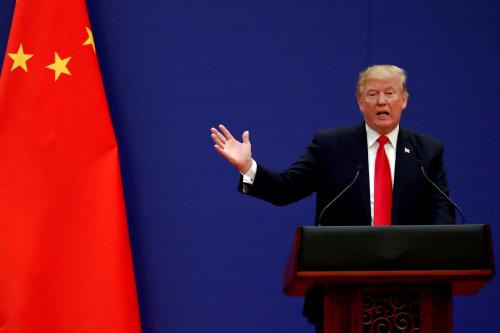
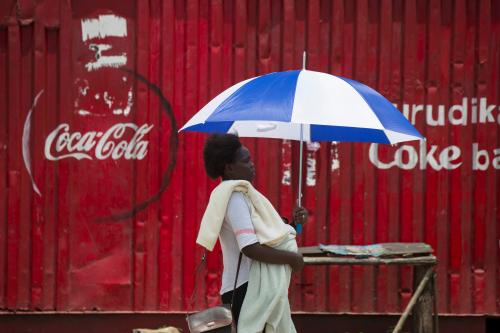
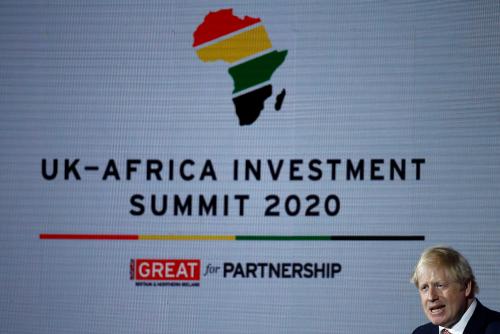
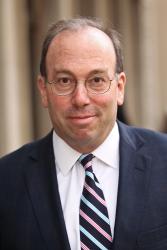

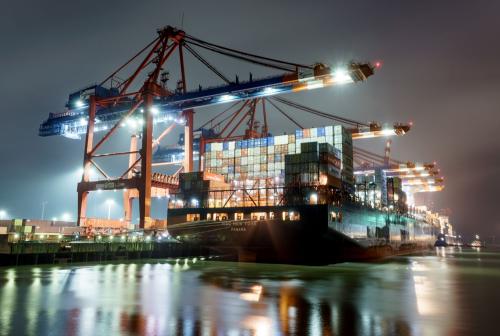

Commentary
Can an investment summit save Trump’s Africa policy?
February 4, 2020